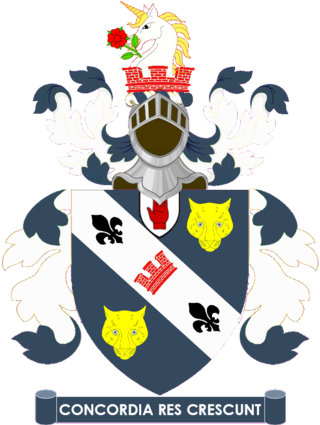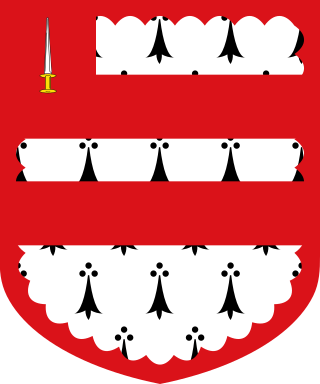
Viscount Hardinge, of Lahore and of Kings Newton in the County of Derby, is a title in the Peerage of the United Kingdom. It was created in 1846 for the soldier and Tory politician Sir Henry Hardinge. His son, the second Viscount, represented Downpatrick in Parliament. His great-great-grandson, the sixth Viscount, succeeded a distant relative as eighth Baronet, of Belle Isle in the County of Fermanagh, in 1986. This title had been created in the Baronetage of the United Kingdom 1801 for Richard Hardinge. He was the third son of Nicolas Hardinge, younger brother of Reverend Henry Hardinge and uncle of the latter's third son Henry Hardinge, 1st Viscount Hardinge. The baronetcy was created with special remainder to the heirs male of Richard Hardinge's father.
The Duff, later Duff Gordon Baronetcy, of Halkin in the County of Aberdeen, is a title in the Baronetage of the United Kingdom. It was created on 12 November 1813 for James Duff, British Consul in Cádiz, with remainder to his nephew, William Gordon.

The Antrobus Baronetcy, of Antrobus in the County Palatine of Chester, is a title in the Baronetage of the United Kingdom.

The Bromhead Baronetcy, of Thurlby Hall in the County of Lincoln, is a title in the Baronetage of the United Kingdom. It was created on 19 February 1806 for the soldier Lieutenant-General Gonville Bromhead. His eldest son, the second Baronet, was a mathematician. He died unmarried and was succeeded by his younger brother, the third Baronet. He was a Major in the Army and fought at the Battle of Waterloo. His eldest son, the fourth Baronet, was a Colonel in the Indian Staff Corps. He was succeeded by his grandson, the fifth Baronet. He was a Lieutenant-Colonel in the Indian Army. As of 2007 the title is held by his son, the sixth Baronet, who succeeded in 1981. However he does not use his title.
The Goold Baronetcy, of Old Court in the County of Cork, is a title in the Baronetage of the United Kingdom. It was created on 8 August 1801 for Francis Goold, with remainder to the heirs male of his father Henry Michael Goold, who gave valuable service to the government of King George III. The Goold family descends from William Gould, who served as Mayor of Cork during the reign of King Henry VII. His descendant George Gould changed the spelling of the surname to Goold. He was the father of Henry Michael Goold and the grandfather of the first Baronet.

The Medlycott Baronetcy, of Ven House in the County of Somerset, was a title in the Baronetage of the United Kingdom. It was created on 3 October 1808 for William Medlycott, Member of Parliament for Milborne Port from 1790 to 1791. The family descended from James Medlycott, of Ven House, who represented Milborne Port in the House of Commons between 1710 and 1722. His son Thomas Medlycott died without surviving male issue in 1763 and left his estates to his maternal nephew Thomas Hutchings, who adopted the surname of Medlycott. His son was the first Baronet. The baronetcy became extinct with the death of the 9th Baronet in 2021.

The Fowke Baronetcy, of Lowesby in the County of Leicester, is a title in the Baronetage of the United Kingdom. It was created on 7 February 1814 for Frederick Gustavus Fowke of Lowesby Hall, Lowesby, near Leicester. He was the son of Lieutenant-General Sir Thomas Fowke, Groom of the Bedchamber to the Duke of Cumberland. His grandfather was Lieutenant-General Thomas Fowke, Governor of Gibraltar. The family surname is pronounced "Foke".

The Wraxall Baronetcy, of Wraxall in the County of Somerset, is a title in the Baronetage of the United Kingdom. It was created on 21 December 1813 for Nathaniel Wraxall. He was in the East India Company Civil Service, an author and member of parliament for Hindon, Ludgershall and Wallingford. His grandson, the third Baronet, was an author.

The Elton Baronetcy, of Bristol, is a title in the Baronetage of Great Britain. It was created on 31 October 1717 for Abraham Elton, Mayor of and Member of Parliament for Bristol from 1722 to 1727. The second Baronet was also Mayor of Bristol and represented Taunton and Bristol (1727–1742) in the House of Commons. The seventh Baronet sat as Liberal Member of Parliament for Bath. The eighth Baronet was High Sheriff of Somerset in 1895. The tenth Baronet was a pioneer of the British documentary film industry.

The Poore Baronetcy, of Rushall in the County of Wiltshire, is a dormant title in the Baronetage of Great Britain. It was created on 8 July 1795 for John Methuen Poore, with remainder, failing heirs male of his own, to his brother Edward Poore and the heirs male of his body.

The Milman Baronetcy, of Levaton-in-Woodland in the County of Devon, is a title in the Baronetage of Great Britain. It was created on 28 November 1800 for Francis Milman, Physician-in-Ordinary to King George III and President of the Royal College of Physicians. The seventh Baronet was a brigadier-general in the British Army.
The Domville Baronetcy, of St Alban's in the County of Hertford, was a title in the Baronetage of the United Kingdom. It was created on 28 July 1814 for William Domville, Lord Mayor of London from 1813 to 1814. He was a descendant of William Domville, elder brother of Gilbert Domvile, ancestor of the Domvile baronets of Tempoleogue. The title became extinct on the death of the seventh Baronet in 1981.

Sir Jonathan Wathen Waller, 1st Baronet, GCH, was an English eye surgeon, who practiced in London during the latter part of Georgian era. He was the eye doctor of King George III of Great Britain and his son William IV. He also attended the death of George IV.

The Lees Baronetcy, of Blackrock in the County of Dublin, was created in the Baronetage of the United Kingdom on 30 June 1804 for the soldier and politician John Lees.

The Nugent baronetcy, of Waddesdon in the County of Berks, was created in the Baronetage of the United Kingdom on 28 November 1806 for Field Marshal Sir George Nugent. He was the illegitimate son of the Honourable Edmund Nugent, only son of The 1st Earl Nugent. The 1st Baron Nugent was the younger brother of the fourth Baronet.

The Shaw baronetcy, of Bushy Park in the County of Dublin, was created in the Baronetage of the United Kingdom on 17 August 1821 for the Tory politician Robert Shaw. The 3rd Baronet was also a politician.

The Kaye, later Lister-Kaye baronetcy, of Grange in the County of York, was created in the Baronetage of the United Kingdom on 28 December 1812 for John Lister Kaye. He was the illegitimate son and heir of the 5th Baronet of the 1642 creation.

The Blackwood baronetcy, of the Navy, was created in the Baronetage of the United Kingdom on 1 September 1814 for the Honourable Henry Blackwood, seventh son of Sir John Blackwood, 2nd Baronet and of Dorcas Blackwood, 1st Baroness Dufferin and Claneboye. He was a Vice-Admiral of the Blue in the Royal Navy and was the bearer of despatches announcing the victory of Trafalgar in 1805. The 7th Baronet succeeded as 10th Baron Dufferin and Claneboye and 11th Baronet of Killyleagh in 1988.

The McMahon baronetcy, of Ashley Manor, was created in the Baronetage of the United Kingdom on 7 August 1817 for John McMahon, Member of Parliament for Aldeburgh from 1802 to 1812 and Private Secretary to George IV from 1811 to 1817. He was the brother of William MacMahon, 1st Baronet of the 1815 creation.
The Price baronetcy, of Trengwainton in the County of Cornwall, was created in the Baronetage of the United Kingdom on 30 May 1815 for Rose Price. He was the grandson of John Price, younger brother of the 1st Baronet of the 1768 creation; and owned the Worthy Park sugar estate in Jamaica.















